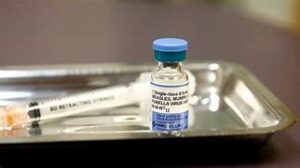Measles cases have been rising in the UK since November 2023 and the UK Health Security Agency declared the increase in cases of measles as a national incident (19th January 2024). Care England is recommending that businesses alert their staff regarding the potential of outbreaks not only in the West Midlands but also in Hertfordshire, as the uptake of the Measles Vaccination (MMR) in the county is lower than recommended.

Measles is a highly contagious airborne disease caused by a virus. It spreads easily when an infected person breathes, coughs, or sneezes, and spending more than 15 minutes in direct contact with someone infected with measles is sufficient to transmit the virus. It can cause severe disease complications and even death. Measles can affect anyone, but it is most common in children.
Measles infects the respiratory tract and then spreads throughout the body. Symptoms include a high fever, cough, runny nose, and a rash all over the body. Symptoms of measles usually begin 10-14 days after exposure to the virus. A prominent rash is the most visible symptom.
Early symptoms usually last 4 -7 days. They include:
- Runny nose
- Cough
- Red and watery eyes
- Small white spots inside the cheeks
The rash begins about 7-18 days after exposure, usually on the face and upper neck. It spreads over about 3 days, eventually to the hands and feet. It usually lasts 5-6 days before fading.

The measles vaccination averted 56 million deaths between 2000 and 2021.
Even though a safe and cost-effective vaccine is available, in 2021 there were an estimated 128,000 measles deaths globally, mostly among unvaccinated or under-vaccinated children under the age of 5 years.
For more information about measles and its symptoms, see Measles – NHS (www.nhs.uk)
Important Advice for Staff and Visitors in the Social Care Sector
The Director of Public Health, Sarah Perman, and Chris Badger, Executive Director of Adult Care Services strongly advise:
If someone thinks they have measles they should not come into work or visit the care home for at least 4 days from when the rash first appears.
The social care sector could be impacted if unvaccinated staff or their children contract measles. Measles poses a risk to vulnerable individuals and can have a significant impact on the workforce. Unvaccinated staff are at risk of contracting measles and, if identified as a close contact with someone with measles, staff may be asked to self-isolate for up to 21 days.
Staff are being urgently advised to be alert to signs and symptoms of measles and urge staff to check that they and their families are fully vaccinated. If anyone has missed one or both doses of the MMR vaccine, it is not too late to catch up. We advise people to contact their GP practice to book an appointment as soon as possible. The MMR vaccine is free on the NHS, whatever your age. Our best protection against measles is MMR vaccination and this will help stop outbreaks occurring in the community.
Further advice and guidance can be found here:
MEASLES – Protect yourself, protect others (publishing.service.gov.uk)
MMR (measles, mumps and rubella) vaccine – NHS (www.nhs.uk)
Thank you for reading this blog and we hope you found it informative. If you would like to get in touch with us for any advice please call 01732 790001, or email: [email protected]. Visit our website at www.carefirst24.co.uk


